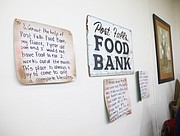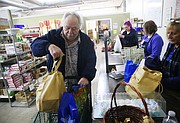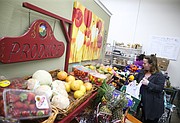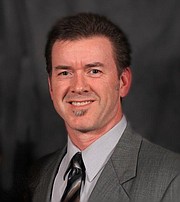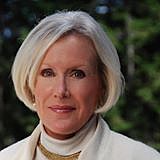Making charity a tool - not a crutch
Imagine charity that makes a lasting difference in people’s lives, that shrinks dependency and grows self-respect.
Maggie Lyons has. That’s why she created Charity Reimagined.
Lyons has just launched the 501(c) (3) nonprofit after intensively studying the work of experts addressing many of the same questions she’s struggled with.
“For years I was frustrated because so much time, talent and money was going to help the financially poor, but this didn’t seem to be producing any lasting change,” she said. “In fact, it seemed like the more money was spent, the worse the outcomes became.”
Some of the painful facts Lyons’ research confirmed:
- Families trapped in generational poverty will likely pass that same lifestyle on to their children.
- The government’s attempt to eliminate poverty — decades of entitlements and charitable programs — has failed. Those programs have succeeded only in creating dependency and entitlement, which is keeping generations of Americans poor.
- We have fooled ourselves into thinking we are helping when we do for those in need what they have the capacity to do for themselves. When the charity of “good intentions” is focused on one-way giving, the people being helped are disempowered and their self-esteem is crushed. They are taught to survive, rather than thrive.
A CPA by training whose paid career involves cleaning up organizations’ financial messes, Lyons has done more than merely observed the pitfalls of poverty and the well-intentioned but misdirected attempts to help.
She’s lived it.
“I was ALICE (Asset Limited, Income Constrained, Employed) growing up, even though my father was highly educated,” she said. “What we didn’t want was to be pitied.”
Nor do most poor people, Lyons has learned. That’s why Charity Reimagined places premiums on principles like dignity and exchange. If your charitable act costs the recipient dignity rather than some sort of effort or modest contribution back, it’s not going to make a positive difference. In fact, Lyons will tell you that kind of giving only perpetuates a deeper problem.
Nobody would agree more than Leslie Orth, the person who manages Post Falls Food Bank and also serves on Charity Reimagined’s board of directors.
- • •
The moment you walk into Post Falls Food Bank, 415 E. Third Ave., you know it’s not like other food banks. You see immediately why Orth, who took the helm three years ago this March, calls it the Third Avenue Market.
There are no needy people lined up like cattle in the cold, awaiting a bag or box of pre-selected donated goods from half-bare warehouse shelves. There are only guests in a grocery store, people endowed with something powerful, something precious: responsibility.
According to Orth, here’s how it works:
Applicants seeking help are fully vetted at the food bank. “It’s hard and it takes time,” she said, but it’s vital because real help can only begin when an honest assessment of the people and their problems exists.
“Through the years I’ve done what I do, I know that piece of paper (the applicants fill out) isn’t necessarily the reality,” she said.
To get to what’s real, Orth and staff spend a good deal of time with applicants.
“We know them. We know their dogs. We know their grandkids,” she said. “Getting to know all about our guests allows us to plug them into other agencies in the community, too.”
At the Third Avenue Market, guests are given points based on number of family members. They shop once a week and decide how to use their points, going up and down food aisles, making difficult choices and sometimes replacing one item in their cart with another. They’re in control.
“They own those points. There’s a responsibility with that,” Orth said.
There are also long-term benefits. Guests become better at planning, budgeting and purchasing, Orth said, skills that they can then share with their children. Before you know it, the scales of dependency begin to tip in favor of the individual better controlling his or her life.
One of the best consequences of the food bank’s approach is that many of the guests are eating healthier. That’s no accident. The food bank charges zero points for produce.
“When you live in poverty, you don’t go to the produce section,” Orth said. “It’s too expensive. Pasta will feed you a lot longer than a bunch of bananas.”
But at the Third Avenue Market, bananas are free. Zero points for produce.
As a result, Orth estimates that guest carts now average 40 to 50 percent produce. Guests aren’t just able to eat more; they’re able to eat better.
On the principle of exchange, Orth said fully 75 percent of guests become volunteers. According to Lyons and Charity Reimagined, that kind of reciprocation is key to people becoming increasingly self-sufficient while restoring or maintaining their dignity.
After all, that’s the end game.
- • •
Charity Reimagined doesn’t target the needy so much as it does those who help the needy: Charities, churches, service clubs and others. There is no charge for any services Charity Reimagined offers, which include consultations and follow-up with board members and other local experts.
But as Lyons is quick to remind, change isn’t easy. In fact, it often begins with disagreements.
“I think it’s really healthy when board members of these nonprofits are starting to argue among themselves,” she said. Arguing indicates that leadership is starting to look at its charitable paradigm — the reason it does what it does and the outcome of that work, she said.
Questioning whether all your best efforts are maybe not producing the long-term change you’ve been working so hard toward takes courage, Lyons said.
“It’s uncomfortable, but it’s so positive because they’re really thinking about this,” she said. “Change comes sometimes in itsy-bitsy steps. It starts with decision-makers asking, ‘Are we doing this the right way, and if not, what do we need to do to change?’”
In attempting to change the paradigm for donors, Lyons said much of the focus today is on discovering what percentage of donations goes to recipients.
“Charity Reimagined takes it so much further than that,” she said.
A better measuring stick, she asserts, is looking at how the nonprofit helps recipients become more self-sufficient, dignity fully intact. That’s one of the key missions that Charity Reimagined intends to build upon.
Frances Huffman, CEO of Tesh, Inc., a nonprofit that helps people with disabilities reach their full potential, is an unabashed fan of Lyons. She predicts good things ahead.
“I believe the impact on Kootenai County nonprofits will be refocusing from ‘doing for’ those in need to honoring their dignity by building their capacity,” Huffman said. “Allowing someone the satisfaction of their accomplishment in lieu of our own satisfaction in our accomplishment will eventually change the focus and the outcome of charities.”
She took it a step further.
“People want to feel good that they have made someone’s life better, but the real pleasure should be with the recipient. They should feel like their life is better because of what they did.”
How far this effort goes remains to be seen, of course. But Lyons is eager to find out — and motivated to get there.
“I’ve learned through my work and my volunteer activities that the opposite of poverty is not wealth,” she said. “This truth is opening a new chapter in my life.”
- • •
Visit Charity Reimagined: charityreimagined.org
SIDEBAR
They’re lining up
behind the leader
While Charity Reimagined is a new organization for Kootenai County, Maggie Lyons is a known — and esteemed — quantity.
Mark Tucker, executive director of United Way of North Idaho, said Lyons emerged as a clear leader in this important quest. After a community ALICE task force meeting some time ago, there was a discussion about the book “Toxic Charity” by Dr. Robert Lupton, he said.
“We questioned what could be done to help our community prevent need instead of simply providing funds or gifts to appease the symptoms,” Tucker said. “Maggie’s passion for really helping others was apparent in her commitment to first understand through research and learning opportunities. She has the knowledge to back up her endless energy to help organizations and their supporters do the right thing, the right way.”
There’s no shortage of seconds to that motion.
“Maggie is absolutely the best one to lead this effort,’ said Frances Huffman, CEO of Tesh, Inc., an organization that helps people with disabilities reach their full potential. “Her passion, knowledge and perspective paired with her influence in the community make her suited ... to lead this charge. She has a clear sense of the need to restore, honor and maintain the dignity of those in our community who need a hand up, not a hand out.”
Linda Cook of Union Gospel Mission in Coeur d’Alene eagerly lends her endorsement, as well.
“Maggie is truly a gift to this community, not only in her capacity to analyze and track financial data, but also for her unimpeachable ethics,” Cook said. “Beyond that, Maggie is that wonderful blend of wisdom and love. We all kick around the phrase ‘toxic charity,’ meaning helping people stay in addiction and hopelessness by taking care of everyday needs. Maggie is on the cutting edge of people in this community who know we must help the addicted to become free and is helping steer strategy to that end.”
- • •
Visit Charity Reimagined: charityreimagined.org
m







